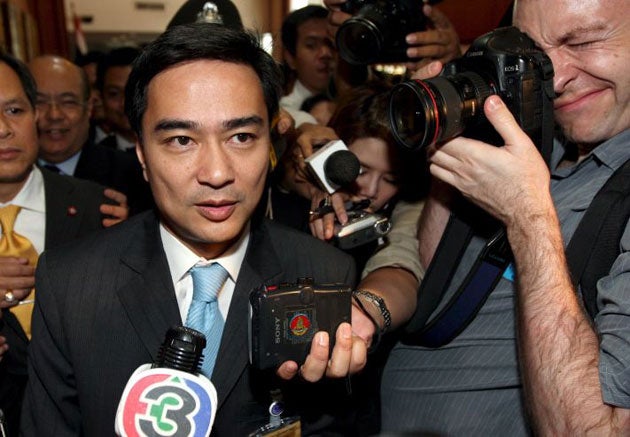Opposition leader educated at Eton is new Thai PM

Your support helps us to tell the story
From reproductive rights to climate change to Big Tech, The Independent is on the ground when the story is developing. Whether it's investigating the financials of Elon Musk's pro-Trump PAC or producing our latest documentary, 'The A Word', which shines a light on the American women fighting for reproductive rights, we know how important it is to parse out the facts from the messaging.
At such a critical moment in US history, we need reporters on the ground. Your donation allows us to keep sending journalists to speak to both sides of the story.
The Independent is trusted by Americans across the entire political spectrum. And unlike many other quality news outlets, we choose not to lock Americans out of our reporting and analysis with paywalls. We believe quality journalism should be available to everyone, paid for by those who can afford it.
Your support makes all the difference.An Oxford-educated fan of Newcastle United Football Club, who also has a taste for Albert Camus, has been elected Thailand's third prime minister in as many months – a position heavy with challenges and political uncertainty.
Abhisit Vejjajiva, leader of the opposition Democrat Party, took charge yesterday with a slim majority and against a backdrop of ongoing turmoil. In an early sign of the challenges he is likely to face, supporters of the former government blocked access to the parliament building after the vote and smashed the windows of MPs' cars.
The Old Etonian, who comes from a wealthy family of Thai-Chinese origin, was elected after a court ruling last month that banned three coalition parties and the then Prime Minister, Somchai Wongsawat, from participating in politics for several years.
Those parties had hoped they could reform under a different banner, but it proved impossible to reach an agreement. As a result, the way was opened for Mr Abhisit, 44. He secured the position yesterday with 235 votes to 198. How long that slim majority holds remains to be seen; by-elections are due to be held for 29 positions that belonged to the MPs effectively sacked by last month's court decision.
Analysts say Mr Abhisit's main task will be to address Thailand's mounting economic problems and to convince foreign tourists that the country is a safe place to visit. Last month, demonstrations by anti-government protesters saw the country's airports closed down and thousands of tourists stranded. For a country that depends heavily on the tourist industry, such incidents are hugely damaging. But the youthful Prime Minister with a penchant for existential angst will also have to deal with his political opponents, namely the supporters of the former leader Thaksin Shinawatra. The onetime telecoms tycoon was ousted in a bloodless coup in 2006 but still has widespread support in the country, particularly amid the rural poor. The previous two premiers have been allies of Mr Thaksin and members of the now-banned People's Power Party (PPP).
"Abhisit is untested and that is both good and bad. He has a clean record. He is well-educated, eloquent and principled so the public will likely give him a chance," Panithan Wattanayagorn, a political scientist at Bangkok's Chulalongkorn University, told the Associated Press. He said that as the opposition leader, Mr Abhisit had not outlined a solution to the many problems facing the country, something that he would have to quickly remedy. "That is his weakness and that lack of decisiveness and clear political stance could turn against him very quickly," added Professor Panithan. "It's going to be among Thailand's roughest premierships."
Just hours after Mr Abhisit's election, the Foreign Ministry said it had revoked Mr Thakin's diplomatic passport. He has spent time in Dubai and China since Britain revoked his visa after his conviction in absentia by a Thai court on conflict of interest charges. Over the weekend, Mr Thaksin addressed – via a pre-recorded video – 40,000 supporters gathered at a stadium. He called for national reconciliation, saying: "May all sides take one step back and respect the results. Please don't use any institution to intervene. Just let the country move forward. Don't make people suffer more."
Mr Abhisit, who is British-born, is known as Mark, though his first name means "privilege" in Thai. He joined the country's oldest party, the Democrats, in 1992 and became one of the youngest-ever members of parliament. He rose through the party ranks and the popularity stakes, especially among educated urban voters in Bangkok.
Old school ties: Other rulers educated in Britain
*King Abdullah II of Jordan attended St Edmund's School in Hindhead, Surrey
*Mohamed Nasheed, the President of the Maldives, attended Dauntsey's School in West Lavington, Wiltshire
*King George Tupou V of Tonga, attended The Leys School in Cambridge
*King Jigme Khesar Namgyel Wangchuck, the ruler of Bhutan, was a student at Oxford University
*Abdullah Gul, the President of Turkey, studied at Exeter University
*Manmohan Singh, the Prime Minster of India, went to Cambridge University
*Mwai Kibaki, the President of Kenya, attended the London School of Economics
Join our commenting forum
Join thought-provoking conversations, follow other Independent readers and see their replies
Comments